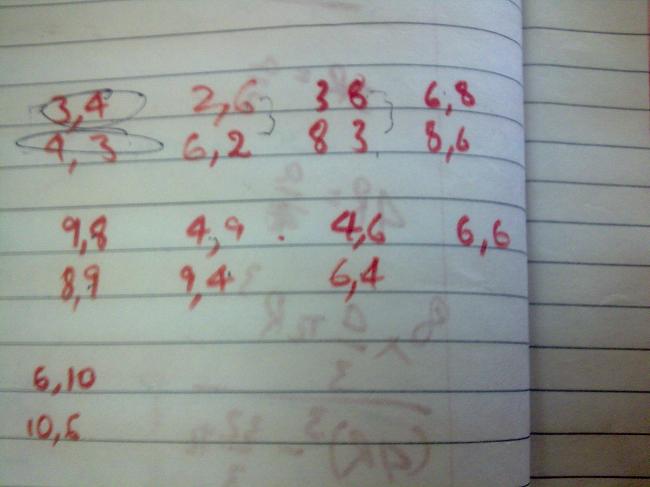i am getting the same as tapan...5/18
what is the probability that the product of two randomly chosen integers is divisible by 12?
-
UP 0 DOWN 0 2 39

39 Answers
is the ans 5/24
i m not sure about being multiple of 4...is it 5/16[7]
bhai log explain the solution yaar.............
Probability aur algebra me haath thoda dheela hai............
5/24.........itz the correct answer.......[1][1][1][1][1][1][1][1]..............
Let there be 2n integers i.e. -n to n
Out of these ,
2k type : 2[n/2] + 1 = n2
3k type : 2[n/3] + 1 = n3
4k type : 2[n/4] + 1 = n4
6k type : 2[n/6] + 1 = n6
12k type : 2[n/12] + 1 = n12
where [.] denotes G.I.F.
Let Required Probability = P
P = Lt n→∞ (n2C1.n6C1 + n3C1.n4C1 + n12C1.2nC1) / 2nC2
= Lt n→∞ (n2.n6 + n3.n4 + n12.2n) / n(2n-1)
= Lt n→∞ ( (2[n/2]+1).(2[n/6]+1) + (2[n/3]+1).(2[n/4]+1) + (2[n/12]+1).(2n) ) / n(2n-1)
Someone Plz. tell me how to proceed after this !!!
the probability that the product is multiple of 3 is 2/3[7]
Sir, can u pl. tell me wer hav I gone wrong in my approach????? [7] [7] [7] [7] [7] [7] [7] [7] [7] [7] [7] [7] [7] [7] [7] [7] [7] [7] [7] [7] [7] [7] [7] [7] [7] [7] [7] [7] [7] [7] [7] [7]
i think if we consider integers upto 12 we could get requisite answer
the total cases will be 11
and possible outcome is 1
so answer is 1/11 as per me
ISSKO DHYAAN SE DEKHO
@tapan.. your method is correct.. but you have not counted the cases correctly!
where are the cases 12n+0?
NO sir i've addded them in the factor : "12 + 11" 11 bcoz (12n + 0)*(12n + 0) is same so ek bar kum.....
otherwise 17 + 12 + 11 = 40
@nishant bhaiyya..
is my approach correct???...if yes pls help to proceed.
@ rkrish
note that you have brought down an infinite set to a set of 12 sets given by
12n, 12n+1, 12n+2, 12n+3 and so on..
So you should look at these 12 sets only and forget that n is infinite!
From here your approach should help a lot!
que 2
wat r the odds in favour of one of the above answers being correct!!!
i think if we consider integers upto 12 we could get requisite answer
the total cases will be 11
and possible outcome is 1
so answer is 1/11 as per me
